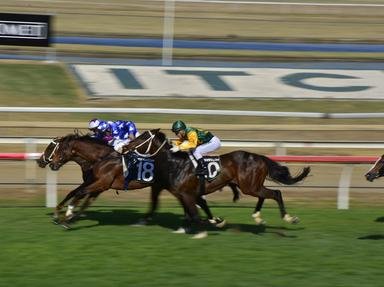Quiz Answer Key and Fun Facts
1. Which horse won the first Melbourne Cup, run in 1861?
2. What was unusual about the Melbourne Cup of 1863?
3. Which was the first horse to win at odds of 100/1?
4. In 1890, in one of the largest fields ever in the Melbourne Cup, who won?
5. Who was the second horse to win consecutive Melbourne Cups?
6. Archer won the Melbourne Cup by eight lengths in 1862. No winner broke that record, or equalled it, until which horse won by the same margin?
7. The modern day Melbourne Cup is usually held on the first Tuesday in November. On what weekday was the very first Melbourne Cup held?
8. What was unusual about the Melbourne Cup in 1866 and again in 1867?
9. What was different about the Melbourne Cup during the years 1942 to 1944?
10. Which horse was the first to compete in six Melbourne Cups?
11. When Jezabeel won the 138th running of the Melbourne Cup in 1998, she was the _________ female horse to win the Melbourne Cup?
12. When Doriemus won the 135th Melbourne Cup in 1995 he was the _______ five-year old to win the Melbourne Cup?
13. In 1972 the race distance was reduced by 61 ½ feet, when Australia adopted the metric system of measurements. The imperial distance of 2 miles (3218.7 metres) was reduced to an even figure, 3200 m. Which horse was the first to win the Melbourne Cup (either 2 miles or 3200 m) in under 3 minutes 17 seconds?
14. The first jockey to win four Melbourne Cups was Bobby Lewis, who rode his 4th winner in 1927. Who was the next jockey to ride four Melbourne Cup winners?
15. When Makai ran second for the second consecutive year, it was the _______ occasion a horse had come second twice, in consecutive years?
Source: Author
Engadine
This quiz was reviewed by FunTrivia editor
gtho4 before going online.
Any errors found in FunTrivia content are routinely corrected through our feedback system.

